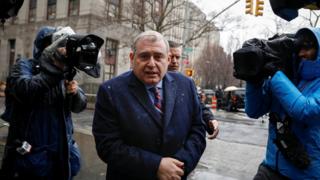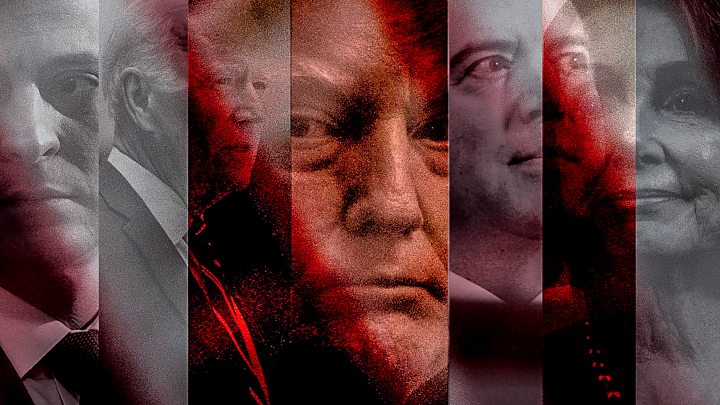 Image copyright Reuters
Image copyright Reuters Democrats in the US House of Representatives have unveiled new evidence as part of the impeachment inquiry into President Donald Trump.
On Tuesday, they released a trove of documents relating to the allegation that Mr Trump put pressure on Ukraine to investigate a political rival.
These included text messages and handwritten notes from an associate of Rudy Giuliani, Mr Trump’s lawyer.
The president denies the allegation and has branded the inquiry a “witch hunt”.
Senior Democrats said they would send the fresh evidence – from Ukrainian-American businessman Lev Parnas – to the Senate alongside the formal articles of impeachment.
The House will vote on Wednesday on whether to send these articles to the Senate. As Democrats control the House, this vote is expected to pass meaning the impeachment trial can begin in earnest next week.
Mr Trump was impeached by the House last month, on accusations of abuse of power and obstruction of Congress. He denies trying to pressure Ukraine to open an investigation into his would-be Democratic White House challenger Joe Biden.
What is the new evidence?
The materials include letters, phone records, notes and flash drives from Mr Parnas, who was born in Ukraine and is a close associate of Mr Giuliani.
They were made available to investigators earlier this week and then sent to the House Judiciary Committee.
The documents show that Mr Parnas was in regular contact with Mr Giuliani as well as Ukrainian officials.
One handwritten note from Mr Parnas, who was indicted last year on conspiracy charges, mentions asking Ukraine’s President Volodymyr Zelensky to investigate “the Biden case”.
Also among the new materials is a screenshot of a previously undisclosed letter from Mr Giuliani to Mr Zelensky, in which he asks to arrange a meeting.
Some of the materials also show Mr Parnas and Mr Giuliani discussing the removal of then US ambassador to Ukraine Marie Yovanovitch. Several text messages appear to suggest that Ms Yovanovitch was placed under surveillance.
The former US envoy was recalled from Ukraine for reasons that remain unclear. Last year, she testified that she was fired over “false claims” by people with “questionable motives”.
Ms Yovanovtich has called for an investigation into the messages. “The notion that American citizens and others were monitoring [her] movements… is disturbing,” her lawyer said.
These documents “demonstrate that there is more evidence relevant to the president’s scheme, but they have been concealed”, Adam Schiff, the Democratic Chairman of the Intelligence Committee, said on Tuesday.
What will happen next?
If the House votes to send the articles of impeachment and this new evidence to the Senate, then the trial will probably begin on Tuesday.

Media playback is unsupported on your device
Supreme Court Chief Justice John Roberts will be sworn in to preside, and he will administer an oath to all 100 senators to deliver “impartial justice” as jurors.
Lawmakers may hear opening arguments next week. The House managers will set out their case against Mr Trump, and the president’s legal team will respond.
The trial is expected to last up to five weeks, with the Senate taking only Sundays off.
The White House said on Tuesday the president was “not afraid of a fight” in his trial.
Deputy press secretary Hogan Gidley said Mr Trump was in fact eager for witnesses to testify that “this man did nothing wrong”.
The impeachment trial will be only the third ever of a US president. But as Mr Trump’s Republicans control the Senate 53-47, he is all but certain to be acquitted as a two-thirds majority is required to convict.
Want to find out more?
Click Here to Visit Orignal Source of Article https://www.bbc.co.uk/news/world-us-canada-51117650

